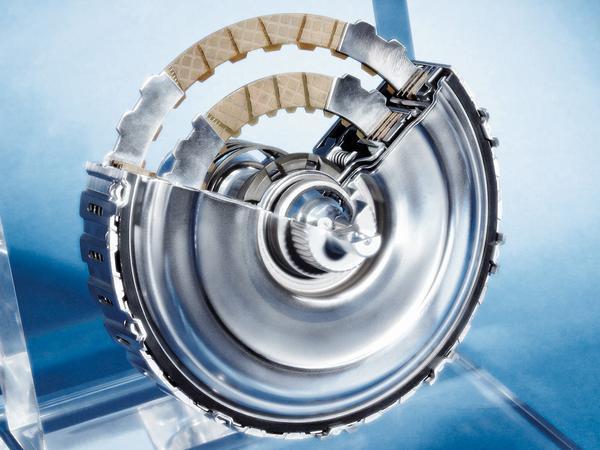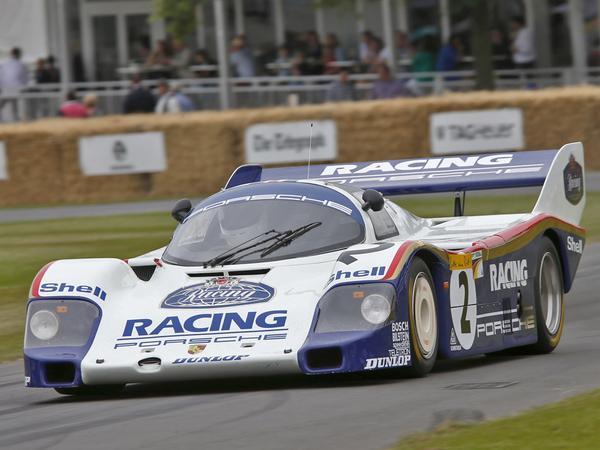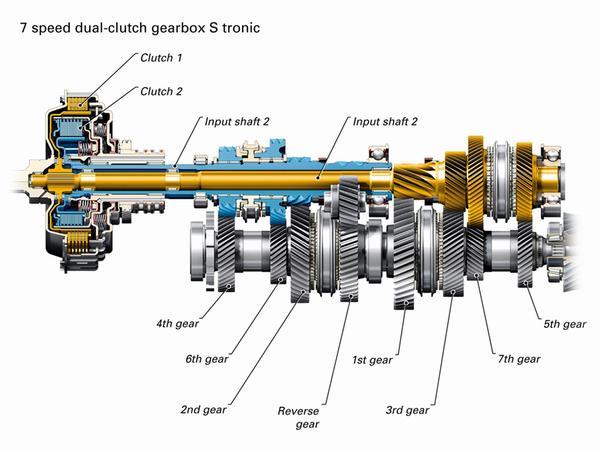PH Origins: Dual-clutch transmissions
Find out how the quest for greater efficiency delivered a more innovative automatic 'box

Swinfen Bramley-Moore was, to say the least, a prolific engineer, businessman and inventor. At the age of just 21, for example, he had already collaborated with motorcycle racer Frank Hulbert and launched the Hulbert-Bramley Motor Company.
That said, it doesn't appear that the motorcycle-based venture did particularly well, given it appears to have folded two years later - perhaps, in part, due to Hulbert moving to Triumph after being extended an offer to be its first factory rider.
Despite this failure, Bramley-Moore didn't stop pursuing his dreams. He moved to Humber in 1910, worked for David Brown in 1911, helped mobilise the army during World War I and established two other engineering companies in the post-war era. He also wrote several books, including 'Notes on the Transmission and Roadside Troubles' and 'Motors in a Nutshell'.

Bramley-Moore filed countless patents, including new designs for bearings, gear teeth, valvetrain components and axles. Most prominent was his work on power transmission methods, however, which saw him lay down countless improvements to manual gearboxes and clutch systems from the early 1900s onwards.
The growing number of components required in these transmissions - and their increasingly complex operation - was proving problematic. So, in order to simplify and streamline the shifting process, Bramley-Moore set about inventing a new kind of 'change speed mechanism'.
His new style of four-speed transmission reputedly reduced the number of gears required, compared to similar designs of the time, by 25 per cent. It featured a pair of overlapping input shafts, instead of just one, and a double-acting clutch; two reverse speeds were also proposed, mounted on a separate layshaft.

Even-numbered forward gears were mounted on one shaft, while odd gears were on the other; the clutch, from its neutral position, could be moved backwards or forwards - engaging it against inner or outer drive cones, routing power down the desired shaft to a different gear with a flick of the pedal. The only driver action required, according to the documentation, was when the gear change involved changing from 2nd to 3rd and back - or when engaging reverse.
The only downside was that actuation of the clutch required considerable attention, with it apparently being fully depressed and held to engage one ratio, then released fully to engage the next - with a mid-position disengaging the friction surfaces from their driving cones.
Alas, despite this manual 'dual-clutch' transmission being documented to the extent that even servicing techniques were outlined, Bramley-Moore's idea appears to have gone no further. Nevertheless, this patent - submitted on 6th August 1919 and accepted on 28th June 1920 - outlined many of the concepts used by modern dual-clutch gearboxes.

French inventor and engineer Adolphe Kegresse then picked up the dual-clutch baton; among other things, he had developed the first half-track vehicles for use in snow-covered terrain. He was also keen on the concept of automatic transmissions and, throughout the 1930s, patented a series of hydraulically controlled multi-clutch transmissions - apparently entirely of his own creation, with no references made to Bramley-Moore's design.
One automatically operated dual-clutch example was reputedly destined for Citroen's Traction Avant, as Kegresse was working for the company at the time. Unfortunately, he died in 1943 and the concept once again slipped back under the radar.
It took until the early 1980s for significant dual-clutch developments to start again, this time with commercial intent. UK-based company Automotive Products had observed that front-wheel-drive cars were becoming increasingly common and foresaw that many future cars would adopt this configuration, along with transverse engine installations.

Bulky torque converter-based automatics, however, were less than ideal in many of these compact front-drive cars. The development team, led by fabled engineer Harry Webster, consequently focused on the potentially smaller, more efficient dual-clutch arrangement. AP was also aware of the previous concepts from Bramley-Moore and Kegresse, as they were both often referenced in the company's own patents.
Several prototypes were developed but the cost and complexity of the transmissions, particularly with regards to the electronics required to control them at the time, seemingly led to a developmental dead-end. Porsche, however, had similarly been exploring the technology and deployed dual-clutch transmissions in its 956 and 962 racers, in 1983 and 1986 respectively. The transmission, although heavier than the manual equivalent, offered quicker shifts and made it easier to keep the engine on song.
Audi was in on the race, too, equipping its 1987 Sport Quattro S1 Pikes Peak car with a dual-clutch transmission. Road trials were also carried out; Porsche outfitted a 928 S4 with its 'Porsche Doppelkupplungsgetriebe' - PDK - set-up in 1987. Controlling the transmission still required complicated hydraulic and electronic set-ups, however, keeping it distinctly in the realms of motorsport and prototype applications.

It was Volkswagen that ultimately delivered the first dual-clutch set-up in a series production car, announcing on 22nd November 2002 that the Golf R32 would benefit from the option of this new transmission. The control systems had finally become affordable and compact enough for mass production and VW's gearbox factory in Kassel could churn out 1000 of them a day.
The six-speed DSG-equipped Mk4 R32 subsequently arrived in early 2003, introducing the general public to the performance potential of swift-shifting dual-clutch transmissions. Audi wasn't far behind, with the VR6-engined Mk1 TT gaining a DSG option in July 2003. It took Porsche, however, until 2008 to release a 997-gen 911 with a dual-clutch transmission, albeit one with seven speeds instead of the VW Audi Group's six.
In any instance, the performance benefits and ease of use were clear in each application - and use of the technology continues to expand, almost 100 years after it was originally envisioned.
For us, the first proper desirable DSG was on the MK5 Golf (GTI) wasn't it? The one offered on the MK1 TT wasn't the same unit and was not quite as fast and responsive as the later ones.
I guess this is what the market demands now and while my A6 has a Tiptronic box which works fine it suits the character & purpose of the car, ultimately in any warm/hot hatch or sports car surely a good engaging manual is still the way to go, even if there is a slight performance deficit.
No prizes for guessing which box I chose even though choice was limited and I guess will continue to be so in future which is a shame.
I guess this is what the market demands now and while my A6 has a Tiptronic box which works fine it suits the character & purpose of the car, ultimately in any warm/hot hatch or sports car surely a good engaging manual is still the way to go, even if there is a slight performance deficit.
No prizes for guessing which box I chose even though choice was limited and I guess will continue to be so in future which is a shame.
Wanting a manual doesn't half seem to reduce and limit your choice of car - more so with used cars, like the S3, when so few people spec'd them when they were available

Also worth a mention might be the Hobbs Mecha-matic box, which used two SDP clutches to control an epicyclic geartrain, to give four forward speeds.
Far more efficient than the old three-speed torque converter boxes and probably an idea that shouldn't have been dropped.
And as for sports cars, I always think if your road car is "too fast" for a manual, then it's too fast, period (as an American would say). But hey, I guess it allows less interested people the chance to enjoy something they otherwise couldn't be bothered with, so that's good.

I think you've misunderstood me completely.
I'm not arguing about which was categorically the first DSG gearbox offered on UK cars. My point was simply that the DSG gained more respect with the iteration offered on the MK5 Golf GTI than it did on the TT, as it was much more improved and raved about by the press.
It's subjective and i'm not saying that everyone had to like it. I just remember many reviewers saying to go for it over the manual and that it's worth the circa £1500 asking price for it. I never heard the same praise for the MK1 TT's DSG so much. Again though, it's not for everyone.
Whether I would buy one outside of warranty is another question as the mechatronic horror stories still make my wallet nervous.
It did however occasionally 'predict' the next gear wrongly if you slowed for a junction and then suddenly decided to go, it wouldn't take long to sort itself out but it could seem like a long time when you wanted power...
Without it, we wouldn't have the stunning ZF 8 speeder either.
Always seem to be more on here lamenting the death of the manual box that those who are actually prepared to go out and specify a new car with said box? If there was a genuine demand, manufacturers would meet it.
Whether I would buy one outside of warranty is another question as the mechatronic horror stories still make my wallet nervous.
Gassing Station | General Gassing | Top of Page | What's New | My Stuff






